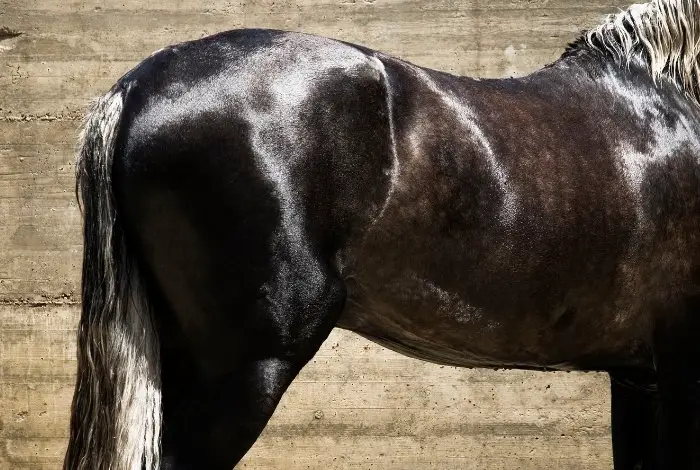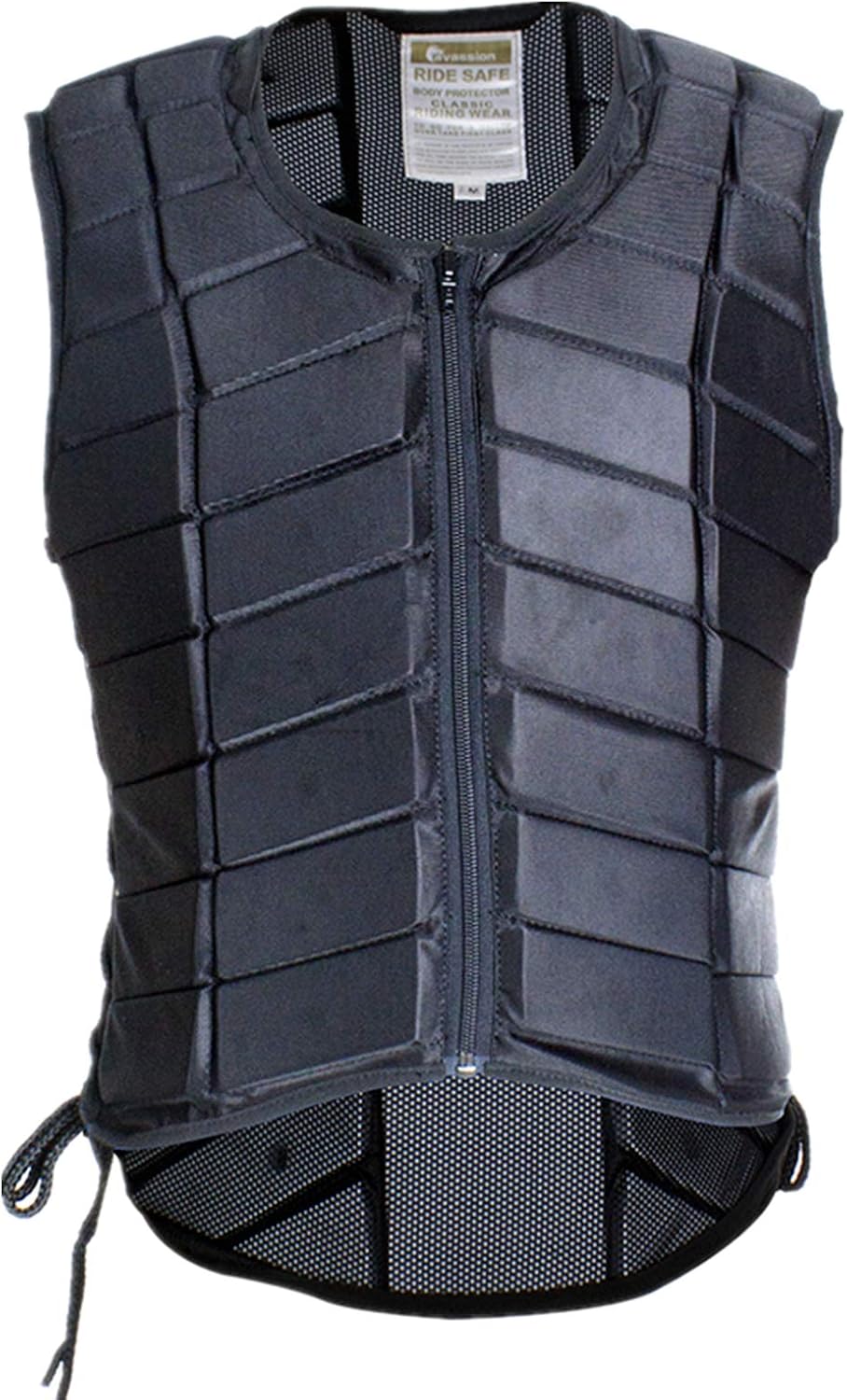Last Updated on March 9, 2022
What is HYPP in Horses – April 15th, 1968 marks a historical day in the Quarter Horse World. Impressive, a beautiful foal with exquisite conformation, a sweet disposition, and a remarkable pedigree, would not only be remembered for setting the standard for halter hoses in three breed registries, but he would also leave behind thousands of his offspring, with a potentially deadly genetic disease. Find more about what is HYPP in horses.
A Little Bit of History
Impressive had a very muscular build, but this was not a sign of his amazing health and conformation, but from a muscular disease called Hyperkalemic Periodic Paralysis or HYPP. HYPP causes uncontrollable muscle contractions, paralysis, and sudden death. The contractions cause muscles to become swollen, therefore creating Impressive muscle-bound structure, and breeders found him to be one of the most desirable Stallions.
Impressive sired thousands of offspring, but the genetic defect went unnoticed until it began showing up in the foals that carried his bloodline. Impressive showed no signs of HYPP, although he carried the genetic mutation and passed it along in what many call the “Impressive” line.
HYPP – Research Begins
In 1989 the AQHA began funding research on HYPP. Dr. Sharon Spier, DVM, Ph.D., and her team did extensive research on the disease and 1992 determined that Impressive bloodline was the only equine to carry the mutant gene and his 2nd and 3rd generation offspring were the primary carriers of the disease.
Find The Best Equestrian Safety Vests Reviews
What is HYPP in Horses – Clinical Signs and Triggers
Clinical Signs
HYPP does not affect all horses the same. Some horses will carry one copy while others carry two copies of the genetic mutation. Horses that carry two copies tend to have more severe attacks than those that carry only one. HYPP positive horses can have minimal symptoms and may only have one or two episodes in their lifetime while others may have multiple episodes a day. Signs of the disease include twitching, tremors, weakness, paralysis, and collapse. Attacks can also cause loud breathing or respiratory noises due to paralysis of airway muscles. Sudden death may also occur due to respiratory paralysis and/or heart failure. Episodes of HYPP can be triggered by change or may show no signs at all.
Triggers
Horses with HYPP can be very sensitive to change. Intense training, being hauled, change in dies, getting sick, being put under general anesthesia, or anything that causes their daily routine to change can cause them stress and can lead to an HYPP episode. A diet with high potassium levels or potassium levels fluctuating and not staying consistent can also trigger HYPP episodes.
How is HYPP Treated
There is no treatment for HYPP, but in most cases can be managed with proper treatments and daily routines. Consult with a Veterinarian is highly recommended so your horse is getting the specialized care that will be the most effective and beneficial for your horse.
Nutrition
Horses with HYPP are very sensitive to diet changes, mainly those that have inconsistent or fluctuation potassium levels. Feeding a balanced diet with a low potassium content of 0.6% to 5% potassium concentration and a maximum of 33 grams total per meal. Stable potassium levels have been proven to be successful in decreasing clinical signs of HYPP.

Choosing a feed that is a production produced, as a complete feed, will have consistent levels of potassium, unlike other feeds such as hay or grass, where the potassium content will fluctuate based on the maturity of the feed. Pasture is also a great way to reduce overconsumption of potassium in horses due to the highest water content in pasture grass, it’s unlikely that large amounts of potassium will be consumed in short periods of time, therefore decreasing episodes. Hydration is also essential in keeping episodes to a minimum, due to the excess potassium in the body being excreted in the urine, Always allow access to fresh clean water, salt, and mineral blocks to help increase and maintain water consumption at all times of the year.
Exercise
Providing daily turnout and/or regular exercise helps maintain your horse hormone levels and blood sugar. Sensible exercise programs also help regulate insulin levels which helps stabilize potassium levels in your horse. It is important to remember that exercise programs should not cause the horse stress, keeping them low stress and sensible will help minimize episodes of HYPP.
Medications
In some cases, a veterinarian may feel it is necessary to prescribe medication for hoses with severe HYPP Attacks. Acetazolamide or Hydrochlorothiazide both have a very high success rate for reducing HYPP symptoms of attacks.
The Future of HYPP
The AQHA is trying to eliminate passing HYPP onto future generations by adding revisions in the official handbook as well as modifying registration requirements for potential carriers of the disease.
Rule Revision – AQHA Official Handbook
Beginning in 1997 revision of the AQHA Official Handbook took place. Under rule 2005, Undesirable Traits was not to be listed and be read as “ HYPP is among the conditions commonly considered to be an undesirable trait or genetic defect such as parrot mouth or cryptorchidism.”
Registration for Carries of HYPP
Beginning in 1998 the AQHA started requesting that all foals that carried the HYPP bloodline must have a notification placed on their Registration Certification, providing horse owners the knowledge needed to avoid passing the trait along to future generations. The following year in 1999 AQHA felt the need for stronger registration requirements and began requiring all potential carriers to be tested prior to being able to become registered.

Many breeders and horse owners feel that the disease will become diluted out and not carried on to future generations, but sadly that is not the case. Any horse affected with HYPP has the same chance of passing on the trait, the same as it was passed from the affected parent to them.
Conclusion
HYPP has a long history and has impacted the equine industry in an unforgettable way. Thousands of horses have experienced this disease first hand and have found many ways to better the quality of life for their horses. With continued management and helping those horses affected with HYPP live the most comfortable lives possible and breeders and owners maintain their diligence in no longer breeding horses carrying the HYPP, which is the only way to eliminate HYPP being found in future horses.
How long do HYPP episodes last?
Horses that are affected with HYPPc an recover from an episode within 15 minutes to an hour and show little to no symptoms between episodes. HYPP episodes can occur without a warning. In severe cases a horse can develop respiratory distress which can be fatal. Some horses may also develop irregular heart function while not exhibiting any other symptoms of HYPP. Most signs of HYPP are non-specific and can be easily confused with other diseases and conditions.
Should you breed a horse with HYPP?
HYPP is an autosomal recessive hereditary condition that is linked to the Quarter Horse sire Impressive. In the case of an affected horse, the problem shows as mild to severe muscle spasms and trembling. Due to the genetic condition, breeders should be aware that any HYPP horses used for breeding purposes are a risk of producing offspring with the problem.
A number of factors influence the outcome of HYPP including breed, age, and gender. A lack of dietary fiber and a diet containing too much corn, barley, oats, soy, and wheat can be detrimental to the development of HYPP. Lowering potassium intake and giving the horse enough exercise helps with managing HYPP in horses.
Can you ride a horse with HYPP?
Should an HYPP-positive horse be ridden? Dr. Spier’s research shows that the chance of a paralytic episode occurring while the horse is being ridden is extremely rare. However, muscles spasm can occur at any time without warning. Therefore, it is very important for an HYPP-positive horse to be monitored by a knowledgeable person whenever he or she is ridden.
What can you do if you suspect your horse may be HYPP-positive? If you suspect that your horse has HYPP, talk to your veterinarian about the possibility of testing. Some horses with HYPP may exhibit signs of muscle stiffness and spasticity, but some horses are asymptomatic. If your horse has no symptoms and your veterinarian suspects HYPP, he or she may conduct a serum test.
What do you feed a horse with HYPP?
HYPP in horses can cause a number of symptoms, including muscle tremors, weakness, paralysis and collapse. If a horse has developed HYPP, then the condition can be treated by intravenous administration of calcium gluconate, bicarbonate and glucose which normally results in fast recovery. The condition can be further controlled by the daily administration of acetazolamide and careful dietary management.
Bermuda grass, prairie grass and timothy are appropriate forage options for horses diagnosed with HYPP. If your horse eats a lot of hay, you can help keep them safe by soaking the hay prior feeding. Soaking hay will leach some of the potassium from hay, which will reduce the risk of high potassium intake.
Can HYPP horses have alfalfa?
Alfalfa hay should not be fed to horses with HYPP as it contains high levels of potassium. Any feed that is high on potassium would further increase issues caused by HYPP. Therefore, if your horse has developed HYPP, you should not include any alfalfa hay in his diet. If you are feeding your horse a commercial feed, you also need to check how much potassium it contains. Take special care with sweet feeds as most commercial sweet feeds contain molasses and soybean meal which can be very high in potassium.
Michael Dehaan is a passionate horse owner, horse rider, and lover of all things equine. He has been around horses since he was a child, and has grown to become an expert in the field. He has owned and ridden a variety of horses of different breeds, and has trained many to compete in shows and competitions. He is an experienced horseman, having worked with and competed many horses, including his own. He is an active member of the equestrian community, participating in events and teaching riding lessons.


